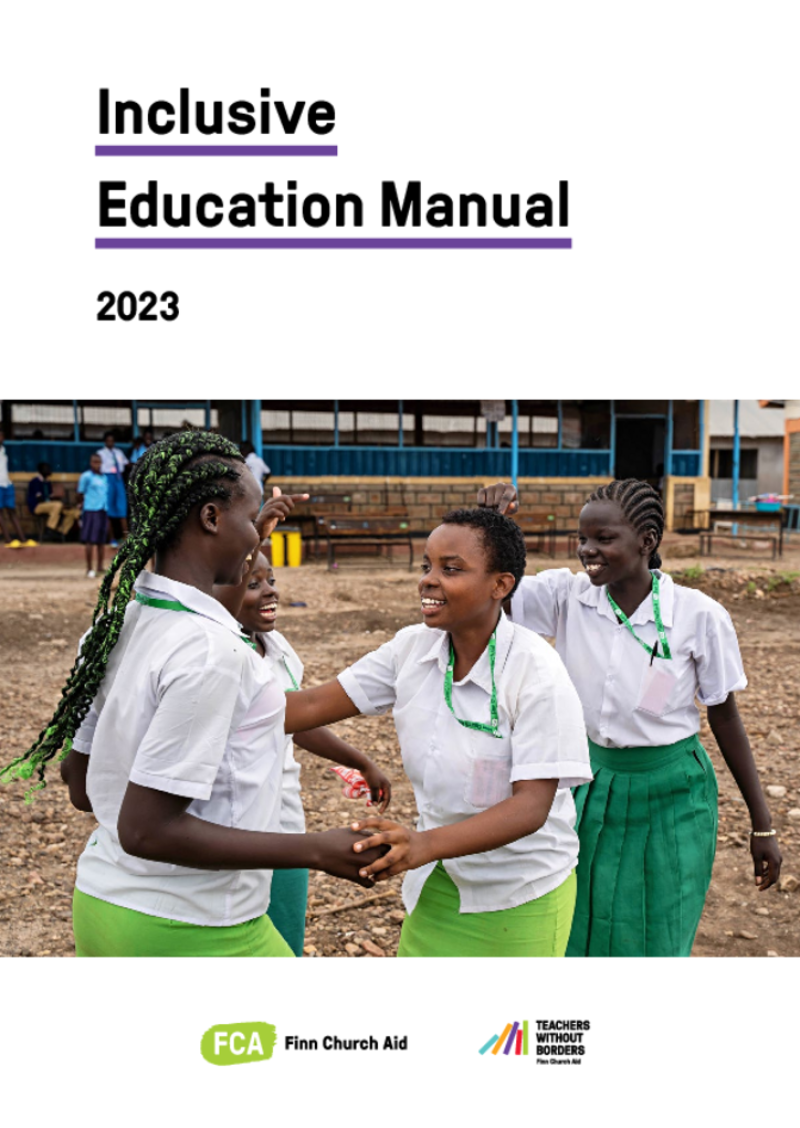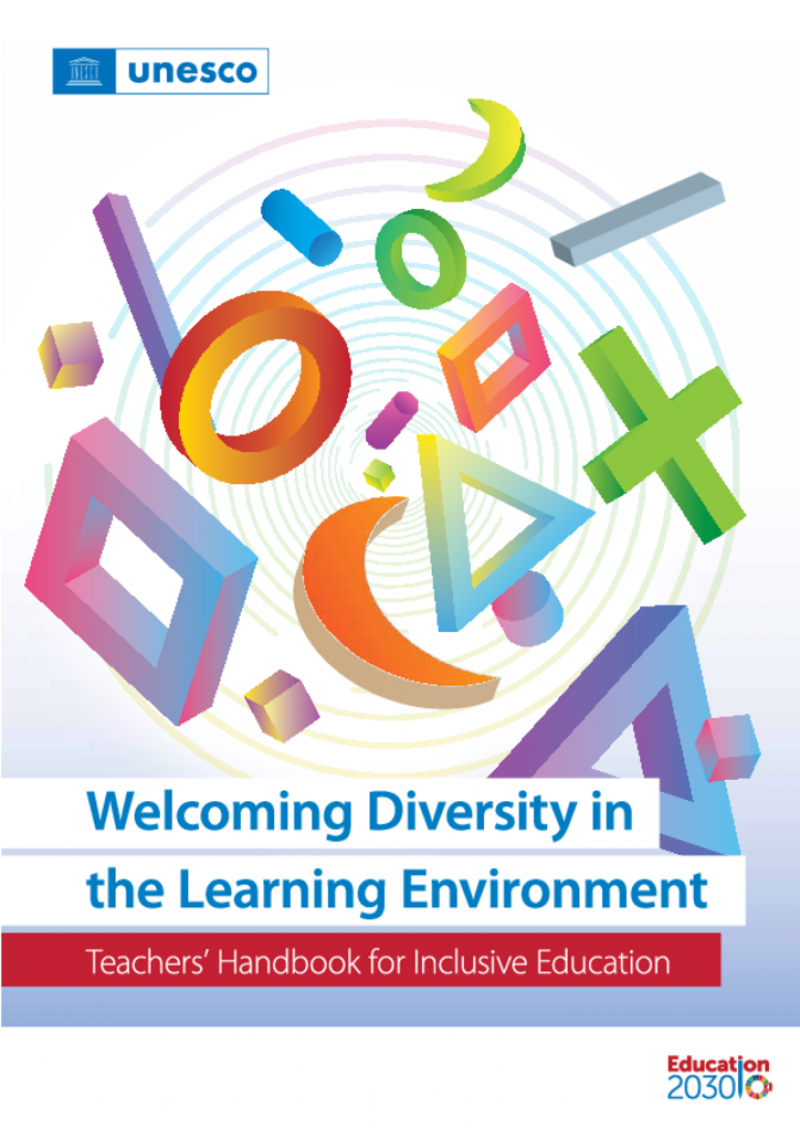Teacher Resource Centre
Displaying 1 - 10 of 10
FCA & TWB Inclusive Education Manual
This Teacher Training Manual on Inclusive Education supports teachers and other education personnel’s continuous professional development in inclusive, quality education especially in diverse low resource contexts and is adaptable for use anywhere in the world. The Inclusive Education Manual directly contributes to realization of several targets of the Agenda 2030 Sustainable Development Goal (SDG) 4 “ensuring inclusive and equitable quality education for all”.
The manual was developed by Finn Church Aid (FCA) and Teachers Without Borders (TWB) Network Finland. The content has been collected and built on the numerous good materials and practices used and co-developed by FCA staff and TWB education experts in different countries and contexts.
The training manual consists of three (3) training modules that can be used flexibly:
- Education, Teacher and School Community,
- Inclusive Education, and
- Positive Classroom and Learning Environment for All Learners.
The content design allows the trainer or facilitator to pick individual modules or sessions and adapt the training content according to the context and target group’s needs.
We hope you find it useful!
Integrating SEL & PSS into Lessons for Quality Holistic Learning
This open, self-paced course, Integrating SEL & PSS into Lessons for Quality Holistic Learning, was designed with a team of teachers working with refugee and vulnerable learners across Lebanon. It is intended to build upon previous learning related to social and emotional learning (SEL) and psychosocial support (PSS) to provide teachers with the confidence to critically evaluate activities, adapt them to their local context, and assess impact on student learning and well-being.
Educators who complete this online course will be able to:
- Define the concepts PSS and SEL.
- Integrate PSS and SEL in lesson plans.
- Create safe spaces for displaced learners, refugees, and other vulnerable students.
- Reflect on tools and teaching pedagogies when implementing PSS and SEL activities.
- Evaluate their adaptation and implementation of PSS and SEL activities.
It will take 8-10 hours, on average, to complete this course. It is entirely self-paced. There is a micro-credential opportunity shared at the end of the course for those interested in demonstrating their competency and earning a digital micro-credential and badge.
Asset (Strength) Based Pedagogies for Quality Holistic Learning
This open, self-paced course, Asset (Strength) Based Pedagogies for Quality Holistic Learning, was designed by teachers for teachers, especially those working with refugee and vulnerable learners around the world. It is intended to provide an overview of key terminology, concepts, and practices related to asset (or strength) based pedagogies.
Educators who complete this short online course will:
- gain a working understanding of what asset-based pedagogies are and why they are important
- be able to identify ways in which asset-based pedagogies can be applied in the classroom
- examine how to apply asset-based pedagogies in the context of their own work
It will take 3-4 hours, on average, to complete this course. A certificate of participation will be issued upon successful completion. Thank you for your interest and for your commitment to your professional learning and to teaching!
A handbook for use offline is currently being developed, as a parallel tool for learning about asset-based pedagogies. Please contact jkasper@ceinternational1892.org to discuss piloting of this additional material.
Introduction to SEL & PSS for Quality Holistic Learning
This open, self-paced course, Introduction to Social-Emotional Learning & Psychosocial Support for Quality Holistic Learning, was designed with a team of teachers working with refugee and vulnerable learners in Niger. It is intended to provide an overview of key terminology, concepts, and practices related to social-emotional learning and psychosocial support.
Educators who complete this online course will:
- understand the importance of creating a safe and inclusive environment for children's well-being and learning in emergency situations
- understand the basic principles of Psychosocial Support (PSS) and Social-Emotional Learning (SEL) and their role in supporting students in displaced contexts, especially considering the educator's unique students and learning context
- integrate simple and applicable PSS interventions and SEL activities into their lesson plans to ensure Quality Holistic Learning
It will take 4-5 hours, on average, to complete this course. A certificate of participation will be issued upon successful completion. Thank you for your interest and for your commitment to your professional learning and to teaching!
An offline, PowerPoint guided workshop series, upon which this course is based, is available for training purposes as well. Please contact jkasper@ceinternational1892.org to discuss piloting of that workshop material.
STEAM +género - Una propuesta para fortalecer la educación inicial con equidad
Esta guía, creada en colaboración entre el Ministerio de Educación de Colombia y la Fundación Siemens Stiftung, con apoyo de la OEA, busca integrar el enfoque STEAM con perspectiva de género en la práctica docente. Centrada en los sistemas educativos de Colombia y Chile, promueve la equidad de género desde la primera infancia, fomentando la participación de niñas y niños en ciencia y tecnología. A través de experiencias educativas y políticas, se pretende reducir estereotipos de género y promover una educación inclusiva y de calidad.
Pedagogies of Belonging: Educators Building Welcoming Communities in Settings of Conflict and Migration
What would it take to ensure that all young people have access to learning that enables them to feel a sense of belonging and prepares them to help build more peaceful and equitable futures? This is a question we have found educators in contexts of conflict and migration ask of themselves each day. And each day, in classrooms around the world, educators are acting in response to this question.
Educators are figuring out what to teach, ways to teach, and how to foster relationships of learning and belonging.
We learn from educators how they create space for dissent, for dialogue, for trust, for new identities, for future-building, and how they envision and build newly imagined and welcoming communities.
Pedagogies of belonging, featured in this book and in its title, emerge from these ways of thinking and acting by educators. We see across educators that what they teach, how they teach, and why they teach in the ways they do come together to enable all young people to feel a sense of belonging and prepare them to help build more peaceful and equitable futures.
This book is about educators and for educators. It is about the practices educators have developed to create welcoming communities in settings of conflict and migration. Each chapter is a “microportrait” of one educator who we have come to know by spending time in their classroom and school.
We focus on the why and the how of practices educators use. We show, through text and art, how educators learn about their students’ experiences, needs, and desires. We describe how educators develop practices to meet these learning and belonging goals. And we recognize how educators address struggles that necessarily arise in this work. We hope the practices give us each ideas to try out in our own classrooms, schools, and other educational sites.
Each microportrait is grounded in research about educator practices. Authors of the microportraits came to know the educators through research projects that included interviews, observations, and sometimes participatory methods. Each project was at least a few months and at times spanned many years. The microportraits include links to articles that can support deeper learning about the contexts and practices of the educators.
This book is a collective project, and we welcome your participation. The intention of this book is that it lives and grows to include more microportraits over time and more patterns of practices that may emerge. Please be in touch with suggestions, to share your experiences with the practices of these educators, or to contribute a microportrait to the collection.
Welcoming diversity in the learning environment: teachers' handbook for inclusive education
This teachers' handbook is intended to serve as a practical resource to help teachers and teacher educators to gain understanding of the multiple issues of inclusion in their day-to-day work and acquire competencies that facilitate inclusive pedagogy. The handbook is comprised of nine modules – each of which presents the conceptual discussion of key topics related to inclusion and diversity and features some promising case studies, instruments and approaches. It also provides a framework for ensuring learning continuity in the wake of crises and emergencies such as the COVID-19 pandemic, and deals with a range of topics aimed at building the capacities of teachers and teacher educators for recovery and resilience in education systems in the COVID-19 context.


